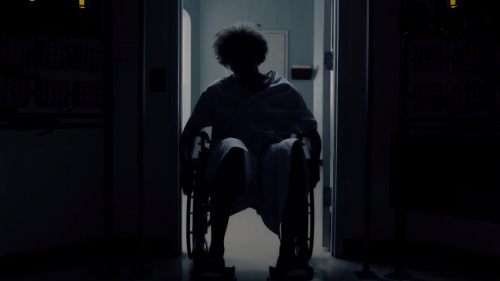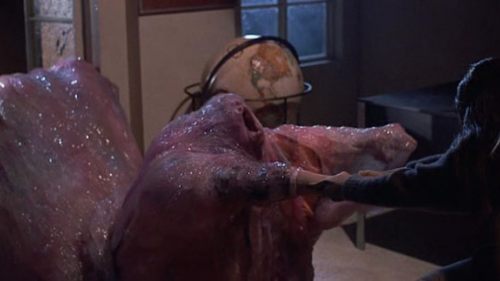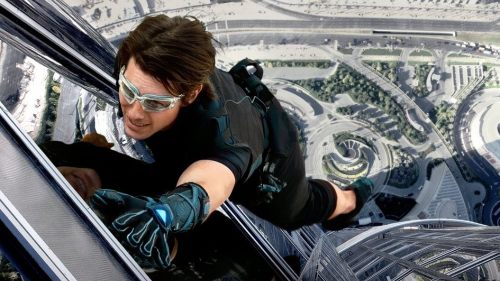Sunday Reads: The Strange Case Of ROBOCOP 2
This article was originally published in 2013.
The original RoboCop stands alongside Casablanca, The Long Goodbye, and a million other films as one of my favorite movies of all time. Whenever I'm called upon to just lay it out there, though, it's my go-to answer for number one. Not only does the film perfectly represent my particular tastes, but it also serves as a great asshole radar. If someone thinks they're really into high-minded films yet turn up their nose at RoboCop, you automatically know they're full of shit.
My love for RoboCop, however, has not extended far beyond the film itself. I've never read the comics, played the video games, or watched the TV show. This also means I have a pretty thin relationship with the film's two sequels. I was nine years old when RoboCop 2 came out in 1990. I know I watched it a handful of times when it hit home video, but that was probably the last time I really gave it much consideration, and my only real thought back then was "Holy shit, that little kid who shot RoboCop in the face and called him the F-word just died! I thought my kind was safe!"
Watching it again after all these years, I find RoboCop 2 kind of remarkable. The sequel manages to get an impressive and unexpected number of things right. It's violent. It's satirical. It's action packed. It tries to do new things with the character. And yet, almost none of it works. This isn't a soulless film, but it somehow looks and acts like one. Rather than go the soft PG-13 superhero route one might anticipate, RoboCop 2 tries its best to follow the tone Paul Verhoeven established with the original. But creating Verhoeven's mixture of comedy, gore, metaphor, action, and flat-out anger proves much harder than it looks. More than anything, RoboCop 2 illustrates why no one but Verhoeven can really be Verhoeven.
But still, the attempt is incredibly admirable. RoboCop 2 doesn't just refrain from softening its edges, it makes fun of Hollywood's habit of diluting original concepts with mainstream concessions. There's a whole section of the film where OCP overloads RoboCop with core directives designed to make him friendlier and more likable, effectively neutering his ability to function. And their replacement machine, cheekily named RoboCop 2, functions only when they murder its unwilling host rather than wait for a more suitable candidate to fall into their laps naturally. In other words, they force RoboCop 2 into production before it's ready and the results are disastrous.
RoboCop 2 also retains Verhoeven's critique of corporate hegemony and Reaganomics. The film is so casual in its equating of corporations with evil that they transfer the first film's innocent OCP head into this film's primary antagonist without comment. A scene in his office reveals a photo of himself shaking hands with Ronald Reagan. And while the first film focused on OCP's privatization of Detroit's police force, RoboCop 2's plot goes much further. OCP loans the city of Detroit a shit-load of money, then maneuvers it into default by goading the police force to strike, at which point they intend to take over the government, thus allowing them to foreclose on and rebuild the entire city. As real estate-based villainy goes, it's a million times better than anything Lex Luthor ever came up with. Plus, Lex Luthor usually loses at the end of his scuffles with Superman; the OCP guys walk away without punishment.
The film doesn't really capitalize on this much, but the police strike means RoboCop starts the film as the only police officer left in Detroit. This isn't actually true, as we still see a police department brimming with cops (including series regular Robert DoQui as Sgt. Reed), and RoboCop's partner, Officer Lewis, still shows up (very) occasionally. But RoboCop 2 definitely opens with the implication that Detroit has become too much of a wasteland for even RoboCop to handle now that he's the city's lone enforcer of justice. The film illustrates this with a series of crimes in which each predator turns into someone else's prey, a chaos in which even the criminals are not safe. After a handful of unpunished crimes we settle on a gun store robbery as the one affront RoboCop actually has the time to deal with. It seems like a drop in the bucket. And it's a good thing he kills everyone involved because the idea of arresting someone within such rampant lawlessness seems laughable.
Our core criminals this time include a tall, prophet-like drug manufacturer named Cain, along with his girlfriend and - for whatever reason - a very young protege (this film has a weird infatuation with children and infants). This trio controls a highly addictive narcotic known as Nuke. Often when films come up with fictional drugs, they fail to really do more than stand in for drugs we already have. RoboCop 2's Nuke seems to take this route at first, but we later discover that (unless I'm totally misunderstanding this) Nuke actually comes in a variety of forms, each of which directs your mood a certain way, an interesting enough wrinkle to give it some character and explain why so many would want to take it.
While RoboCop's street level crime met white collar villainy via the mutually beneficial relationship between Clarence Boddicker and Dick Jones, RoboCop 2 tries to make the same point through a more complex setup. Here, the criminals attempt to bail Detroit's government out of OCP's ironclad legal clutches by giving them enough money to pay off their enormous debt on the condition that Nuke production and distribution essentially become legal. Characteristically, RoboCop 2 presents this interesting notion only to abandon it by having RoboCop 2 shoot nearly everyone involved to death the moment it's put on the table.
Meanwhile, the evil corporation takes our street-level boogyman and literally destroys him. We don't get enough time with Tom Noonan's Cane to really know him very well, but he does seem like a bad guy, especially after he has an informant vivisected for snitching. The moment he enters OCP's hands, however, he's nothing, a worthless peon for them to crush just like everyone else. So when his RoboCop 2 rebels against their control at the end, there's a certain tinge of revenge at play, a bit like when King Kong escapes his chains and beats the shit out of New York.
The film even hosts a weird bit of sadness, too, as RoboCop stalks his ex-family, pining for some kind of life with them, only to be told by his wife's lawyer to fuck off, only to be confronted by his crying wife in the flesh, only to tell her to fuck off for her own good. You think he's just being needlessly hard on himself, and that it'll all work out in the end, but nope. He really makes the decision then and there to remove himself from his family's life forever. It's sort of painful since we know he's very much still Alex Murphy under all that metal.
On paper, all this stuff is great. But the execution is mostly alive, as well. Fans of stop motion animation absolutely must see this film as the big fight between RoboCop and RoboCop 2 is created almost entirely with the technique. While the animation is rough in comparison to the first film, there's a lot more of it overall. And it's hard to imagine NOT loving the sight of a stop motion animated RoboCop hugging the back of a wild robotic monstrosity. On top of that, we get an amazing animatronic Peter Weller halfway through the film that I could look at for hours. It may be a case of quantity vs. quality, but RoboCop 2 provides a surprisingly robust buffet of old school special effects.
And then there's the silliness. For all its violence, the film has a much more overtly comedic tone than the first. The friendly RoboCop is a delight, both funny and worthwhile for the new set of clothes it offers this somewhat limited character. And you can't get more pulpy sci-fi than by displaying a guy's disembodied brain, spinal column, and eyeballs in a vat of bubbling liquid. How do you not get excited about a movie where a gang of adorable tee-ball players rob a pawn shop and beat the owner with bats, especially when their coach/gang-leader gets violently shot in the head just outside?
So where does RoboCop 2 go wrong? If it contains all these great elements, why does it not add up to a more entertaining film? Normally I can identify and understand what it is I didn't like about a movie, but here the missteps are much more difficult to pinpoint.
There's a cheapness to RoboCop 2 that might hurt it some. Too many altercations between RoboCop and Cane's crew take place in the same abandoned industrial settings we saw at the end of the original RoboCop. Furthermore, there's something particularly flimsy about RoboCop's outfit in this one, like you can see its plasticity on screen. The film's scope isn't much more limited than the original, yet its Detroit feels far more staged.
The structure also raises problems. While the story makes sense on paper, actually watching the film feels like an anthology of RoboCop shorts. There's the RoboCop vs. Cane stuff, the RoboCop vs. OCP stuff, RoboCop and his wife stuff, and the RoboCop vs. RoboCop 2 stuff. Meanwhile, we spend a lot of time both on OCP's plans to take over the city and their troubles coming up with a RoboCop replacement. These plots all connect in a satisfying way script-wise but as presented feel fractured and divided, keeping the film from coming together the way it should.
The film begins with Murphy lamenting the loss of his humanity, yet everything that follows really seems eager to reinforce his robotic side, thereby justifying his decision to shun his wife and throw himself totally into police work. This is a strange choice to make. As the film discards Alex Murphy, we in turn begin to discard RoboCop. Nancy Allen's Officer Lewis shows up in the film, but only in a perfunctory capacity. When overloaded with OCP directives, it's not Lewis who tells us RoboCop has changed (though she definitely notices); the warning instead comes from some scientist we barely know.
RoboCop is not all that likable character to begin with. He's cold, stoic; he can barely move. The first film got away with this by focusing not just on the monster but the Frankenstein who made it as well. On top of that, Verhoeven let his RoboCop show real emotion even before he takes his mask off for the big finale. Here we get to witness an interesting alternate version of the character (the polite RoboCop) but little of his emotions or drive. One of the best moment we get from the character is this simple image:

Here we see two cops checking out a dangerous situation (a rampaging RoboCop 2) from behind a police car (alongside a bunch of other police officers offscreen). This is the only moment in the film where RoboCop seems to actually be a part of a police force rather than a stubborn, unfriendly monolith of justice, and it's kind of cool to see him in that context.
If it's been a long time since you've seen this, or if you've never seen it at all, I think it's worth another look, even if I also think it's largely a bad movie. There's no way RoboCop 2 was ever going to reach RoboCop's highs, but were the glue that held it together just a little stronger, this could have been great. As is, it's somewhere slightly to the left of good, which is an interesting enough variation on failure to warrant a closer look.



